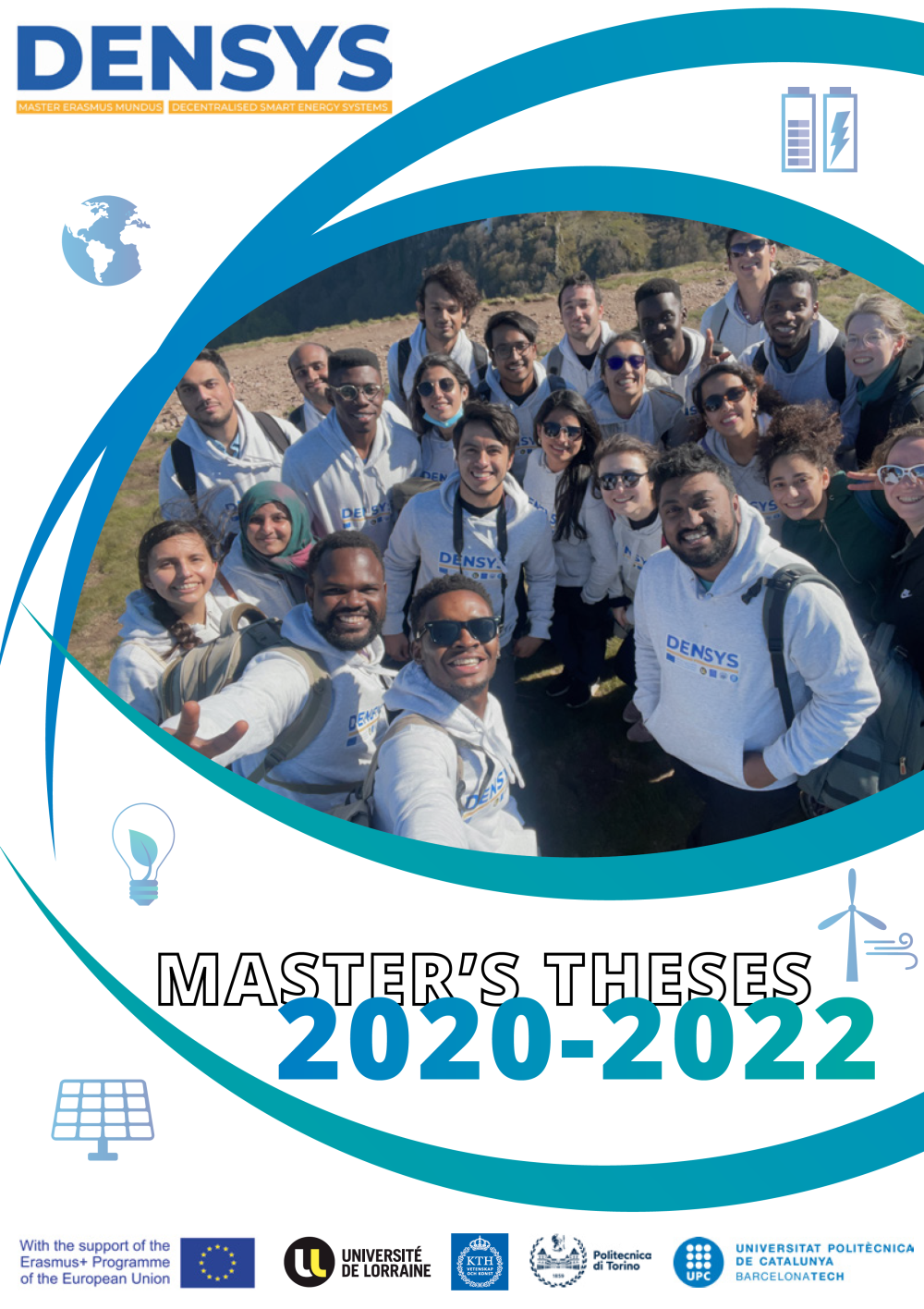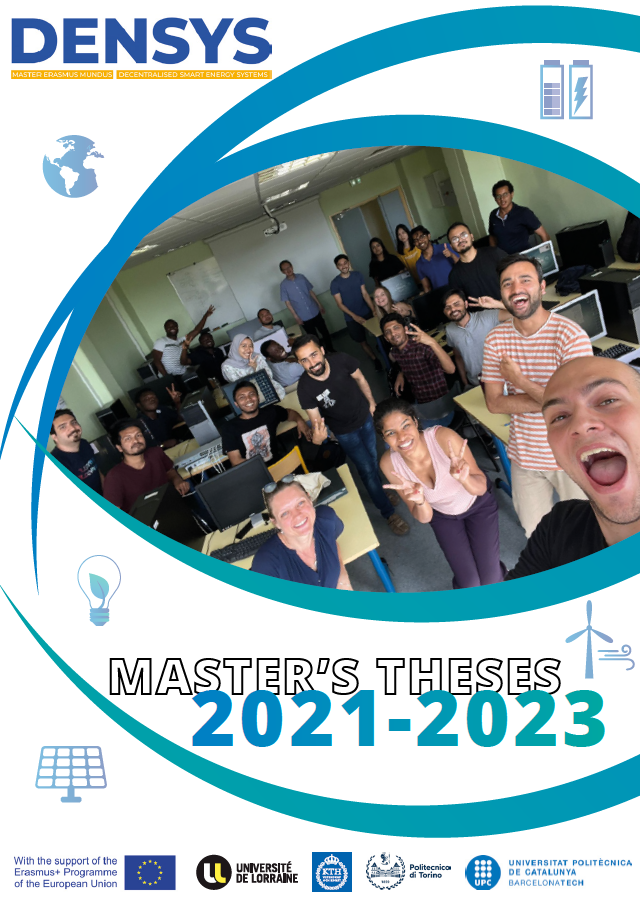A programme with innovative features
The programme will provide students with a systemic overview and the ability to dialogue with a large panel of specialists while having solid core competencies. For that purpose, the “T-shaped” training profile will be implemented, the vertical bar being the deep core speciality of multiphysics engineering, as the horizontal bar represents the mind-opening disciplines that will be taught via a large spectrum of breadth courses (mandatory or elective).
Students are actors of the architecture of their education and thus their skill profiles: they can choose a challenge topic, elective modules, and their 3rd-semester specialization track.
The organization of summer schools with the active participation of the students, for organization purposes and taking part in the scientific programme
Reinforced cooperation with industry and other societal actors as decentralized energy systems implementation requires a close dialogue between industry, energy operators, local authorities and citizens. Industry and social actors will be involved via the challenges and the master thesis internships.
The culture and language component on all locations of the master: to increase multicultural awareness and mind opening.
Programme content
DENSYS students will at least study in two universities: the 1st year is spent in Université de Lorraine (Nancy, France), the third semester year will be upon the choice of specialization and can be spent either in KTH (Stockholm), in UPC (Barcelona) or in Polito (Turin).
1st and 2nd semester
At Université de Lorraine, Nancy and more precisely at the Faculty of Science and Technology – fst-en.univ-lorraine.fr – (60 ECTS): Students will receive a strong multiphysics-oriented engineering education and the required basis of the key technologies of decentralized energy systems, i.e. the vertical bar of the T-shaped profile, which corresponds to 42 ECTS and includes the case and challenge based modules for the first year. This will optimally prepare the students to follow the specialization track where their knowledge will be deepened.
3rd semester
Three specialization tracks will be offered to the students:
- track 1: Decentralized energy systems in a global energy system (KTH, Stockholm) – 30 ECTS
- track 2: Thermal Energy Engineering (UPC, Barcelona) – 30 ECTS
- track 3: Energy-to-X: innovative pathways for energy storage (PoliTo, Turin) – 30 ECTS
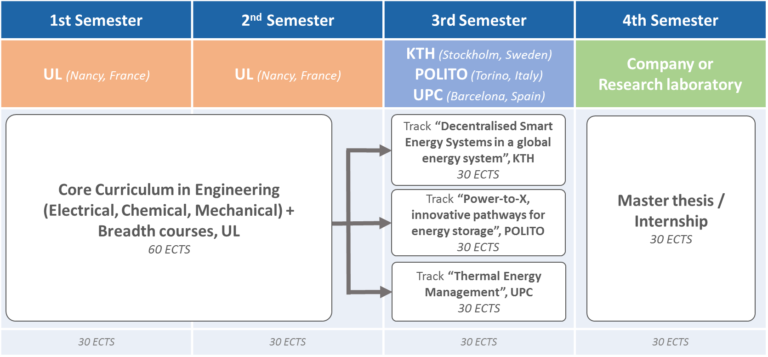
The architecture of the three specialization tracks is built jointly and in a fairly similar way for the three universities where the 3rd semester will take place: specialized engineering-oriented courses (60% of the total of 30 ECTS for KTH and PoliTo and 65% for UPC including the follow-up of the challenge based module), mandatory breadth courses (20 % for KTH and PoliTo and 16% for UPC), elective courses (20 % for KTH and PoliTo and 19% for UPC).
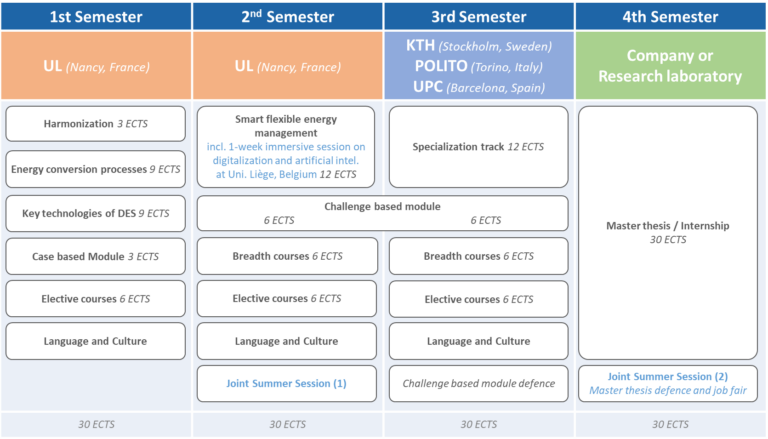
4th semester
Master thesis/Internship: the 4th semester is devoted to an internship/master thesis, which can be either in industry or a research laboratory within the consortium partners and associated partners or in a third party. If you want a better of what you can do for your Master’s thesis, here are booklet we edit every year.
Detailed programme content
Here is a full document describing in details the program content course by course: DENSYS Booklet – 137 pages – 3 Mo
Degrees
At the end of the programme, the student will be awarded two degrees:
- Master Energie parcours “Decentralised Smart Energy System”, Université de Lorraine, France
and one of the following degree depending on the specialisation track selected for the 3rd semester:
- Master of Science (Teknologie Masterexamen), KTH, Sweden
- MSc in Energy and Nuclear Engineering (Laurea Magistrale in Ingegneria Energetica e Nucleare), PoliTo, Italy
- Erasmus Mundus Master in Decentralised Smart Energy Systems, with Thermal Energy Engineering Specialization, UPC, Spain
Highlights on the pedagogy and events
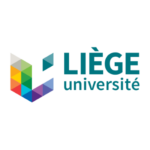
Immersive week in University of Liège (year 1, semester 2)
A one-week immersive session is organized in University of Liège (Belgium), acting as an associated partner of the EMJMD, on the topic of digitalization and artificial intelligence applied to energy network management. The session will be organized by one of the world-leading expert in the field, Prof. Damien Ernst and his staff.

Summer schools
Two joint summer sessions will be organized over the two years, one during the 1st year and one during the 2nd year. These summer schools will be the opportunity to deepen topics, like entrepreneurship and finance in the energy field (in ESADE Barcelona), hydrogen energy (UL, Nancy), power-to-X energy storage (PoliTo, Turin) and energy systems modelling (KTH, Stockholm). During the summer schools, students will have the opportunity to meet industrial and societal actors: lectures and industry and energy site visits will be proposed.
Case based module and challenge based module
- Case based module (1st sem.)
The module of semester 1 “Key technologies of DES”, will embed a case based module. The students (grouped by 5 or 6) will have to work on a problem coming from real life, for which solutions are robust and existIt is also an introduction to multidisciplinary work, where students face several technologies involving different engineering disciplines and non-technological issues (economic, societal implications). The learning outcomes are the reinforcement of the knowledge, the ability to formulate a solution while learning in team, ability to consider aspects beyond technical and technological issues.
- Challenge based module (spanning up on 2nd and 3rd sem.)
The challenge will rely on the learnings of the module “smart and flexible energy management in DES” taken in a broader context and therefore integrating energy networks, demand side, optimization according to technical, market, regulation, and human and societal constraints.
The students (by groups of 5 or 6) will have to discover solutions of an open problem and mobilize knowledge for a practical application: this may include technological objects, systems, and services. A comprehensive systemic analysis that takes into account economical, business and societal aspects is included.

